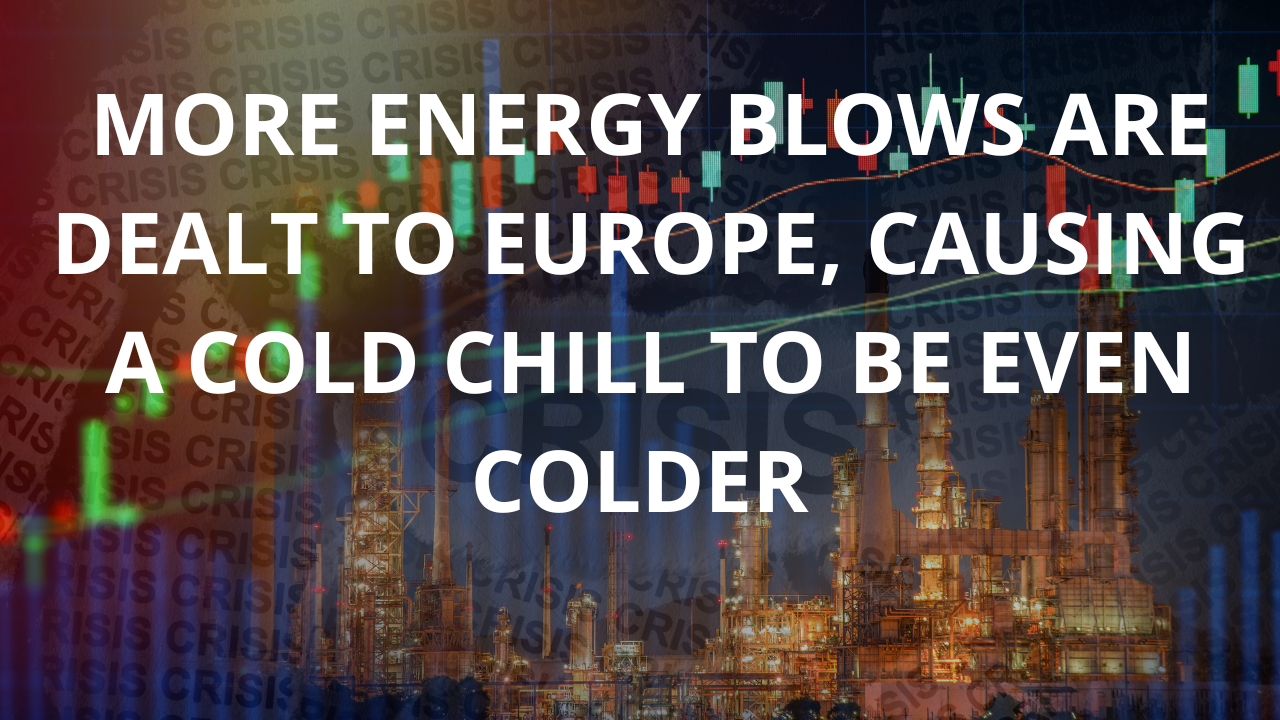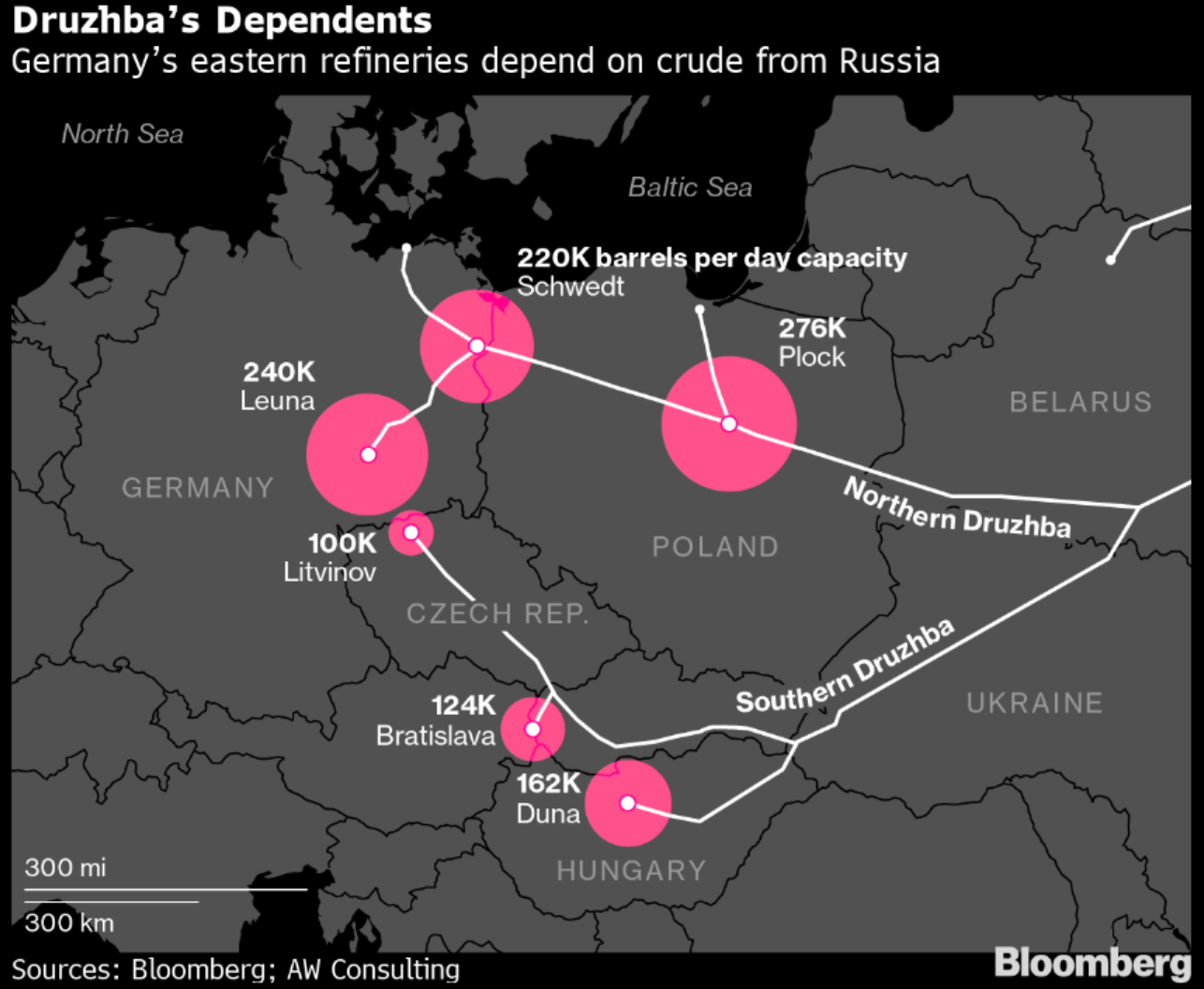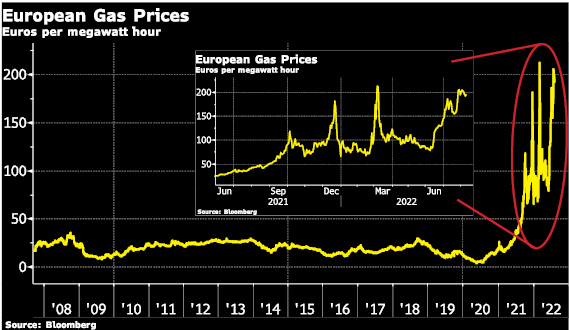When people ask why they should invest in gold or buy silver coins, we often explain that they should do so because they are a form of insurance. Many of us are taking steps right now to protect ourselves from the impact of inflation on our day-to-day spending, others are trying to manage the increase in interest rates and maybe you are preparing your home so your energy bills won’t be impossible to manage. These are all ways of insuring ourselves against major changes that we all face. But how are you insuring your savings and portfolio against the impact of inflation, war in Europe (or elsewhere) and other unforeseen events? This is where gold bars or silver bullion comes in. As today’s blog outlines, the energy crisis appears to just be in its infancy, and gas
Topics:
Stephen Flood considers the following as important: 6a.) GoldCore, 6a) Gold & Monetary Metals, Commentary, commodities, Economics, Energy, Featured, Gold, gold price, gold price news, gold price prediction, gold price today, gold prices, inflation, News, newsletter, Precious Metals
This could be interesting, too:
finews.ch writes DC Bank startet beschwingt ins Jubiläumsjahr
finews.ch writes SNB lockert Geldpolitik auch mit dem Argument der Asymmetrie
finews.ch writes Schweizer Banken-Marken verlieren international an Boden
finews.ch writes Die Nationalbank lockert weiter
| When people ask why they should invest in gold or buy silver coins, we often explain that they should do so because they are a form of insurance. Many of us are taking steps right now to protect ourselves from the impact of inflation on our day-to-day spending, others are trying to manage the increase in interest rates and maybe you are preparing your home so your energy bills won’t be impossible to manage.
These are all ways of insuring ourselves against major changes that we all face. But how are you insuring your savings and portfolio against the impact of inflation, war in Europe (or elsewhere) and other unforeseen events? This is where gold bars or silver bullion comes in. As today’s blog outlines, the energy crisis appears to just be in its infancy, and gas prices might not be the only thing that is beginning to cause problems, giving us even more reason to insure our portfolios. Europe was dealt another blow in the energy crisis at hand this week as oil supply from Russia was cut off for three European countries over a payment issue that resulted from sanctions. |
 |
| The problem occurred when the Russian pipeline operator paid the transit fee on July 22 to the Ukrainian operator.
However, they received the money back because it was not authorized under sanction rules which prohibit European bank involvement with any transactions from Russia. Only with explicit authorization from European regulators to conduct settlements could Russia’s money be sent. The authorization did not come. Moreover, the payment dispute has resulted in the southern section of the Druzhba pipeline being turned off. The three countries, Hungary, Slovakia, and the Czech Republic are all very reliant on oil from Russia to fuel their economies (estimated at about 250,000 barrels a day in 2022). Also, if the dispute over payment doesn’t resolve in the coming weeks a dire situation will ensue. Moreover, oil flow through the northern end of the Druzhba pipeline through Poland and Germany was not halted. Europe is also heavily reliant on supplies from Russia for diesel, natural gas, and coal. Supply problems which started in December 2021 (see our January 20 post European Energy Crisis: 4 Things You MUST Know!) have only escalated as the Russia/Ukraine war continues. The flow of natural gas in the Nord Stream 1 pipeline has been reduced to around 20% of normal capacity. This is making it very difficult for Europe to increase its reserves for winter. |
|
Major Energy Crisis: The Worst NightmareGermany is the bloc’s largest consumer of Russian natural gas, followed by Italy which gets approximately 40% of its supply from Russia. Additionally, concern has grown that Russia could cut its supply of natural gas completely. Although countries are running “save energy” campaigns and looking into alternative sources of energy this crisis is far from over. Additionally, Europe is not the only region affected. Fatih Birol, IEA Executive Director, warned in mid-July that
Also, Birol went on to say that
|
|
| Also, this faster adoption of government policies are already evident inside ‘The Inflation Reduction Act’ passed by the U.S. Moreover, the Senate which injects upwards of U.S.$360 billion into the U.S. clean energy economy.
Part of the money is earmarked for the power sector and electric vehicles with another section awarding tax credits, grants, and loans totaling US$260 billion to companies in the clean energy sectors. These clean energy incentives include mature sectors such as solar, wind, and nuclear along with innovative technologies such as hydrogen and carbon capture and storage. |
|
The Chinese DominanceWith the shift away from Russian energy comes also a shift away from China’s manufacturing advantages. Chinese companies currently control around 80% of the global supply chains for solar power. Its current pacing is set to reach 95% by 2025 according to the IEA. China also currently dominates much of the lithium-ion battery sector. It also is a key producer of wind turbines. Also seeking to quickly build capacity in clean hydrogen technology (Bloomberg.com). Although, this major shift is going to take time, money, and security of resources. New resources and new supply chains must be found and built which means more government spending. This will lead to central banks buying that debt. The short of it is that the economic environment is shifting again as governments continue to scramble to speed up spending for new initiatives. Gold and silver will benefit from higher prices because more printing and borrowing push the metals higher. If you’re enjoying our market commentary, why not tune into our podcast or our YouTube Channel? Check out our interview with Steve St. Angelo for more on how energy dynamics are evolving and how this will increase the need to own gold and silver. Or, see the latest The M3 Report with silver guru David Morgan and technical analysis from Gareth Soloway, as well as insights from our own team. |
Tags: Commentary,commodities,Economics,Energy,Featured,Gold,gold price,gold price news,gold price prediction,gold price today,Gold prices,inflation,News,newsletter,Precious Metals


